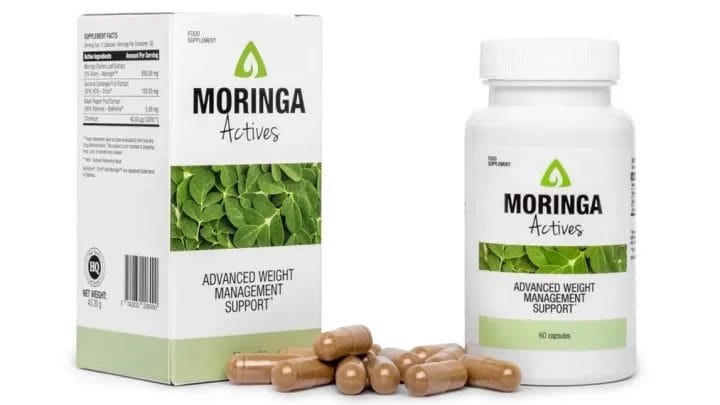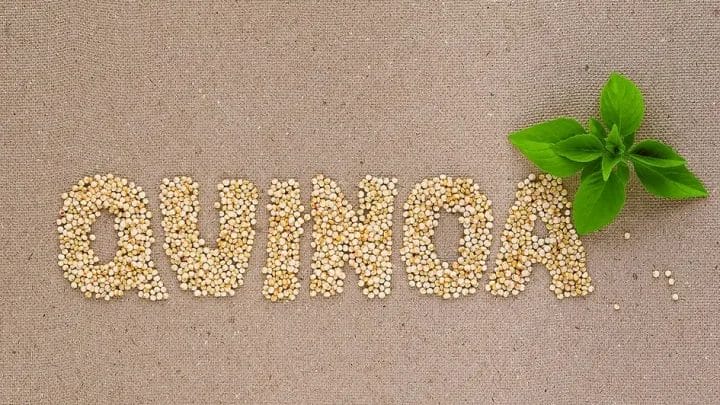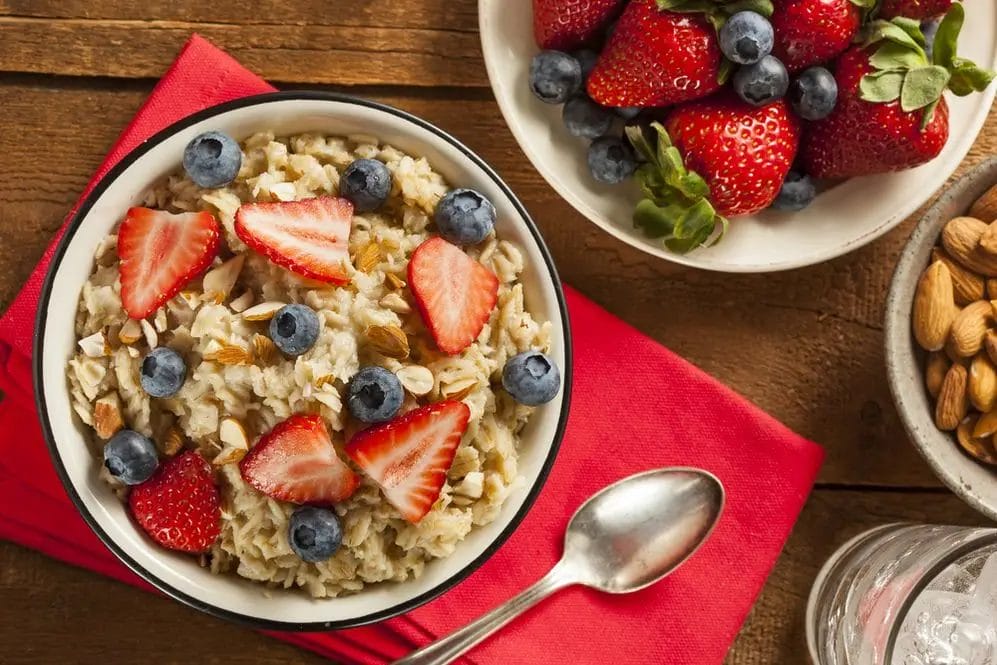
Oatmeal diet – treat yourself to a healthy, beautiful look and slim figure with the help of invaluable oatmeal!
Oatmeal diet, or oatmeal diet, attracts the attention of a growing number of people, not only those who aim to eliminate excess weight, but also those who want to take better care of their health and beauty. An important advantage of this diet is its beneficial effect on the entire body. During the oatmeal diet our menu is based on natural oatmeal, which is a treasury of nutrients beneficial to us, and at the same time the presence of unfavourable components of our body is zero. Do you want to nourish your whole body and improve the condition of your skin and hair? Do you want to lose weight in a safe and effective way without the yo-yo effect and without constant dietary sacrifices? Try the oatmeal diet!
Contents
- 1 Oatmeal – nutritional values
- 2 Oatmeal – calories
- 3 Oatmeal – calories
- 4 Oatmeal – glycemic index
- 5 Oatmeal – health properties. Why is it worth permanently introducing oatmeal into the diet?
- 6 Oatmeal diet – types. From instant to long-term oatmeal diet
- 7 Long-term oatmeal diet – rules, menu, allowed and not allowed products
Oatmeal – nutritional values
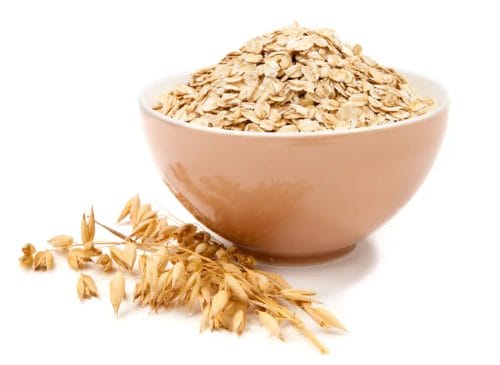
Oatmeal diet is a patent for good shape, vitality and slim figure. It consists in frequent introduction of oatmeal to the menu, either in the form of various oatmeals, or as an addition to other dishes.
However, before we move on to the types and principles of oatmeal diet, it is worth learning a little bit about oatmeal itself, which, due to its excellent composition and specific structure that promotes good work of the digestive system and efficient detoxification of the body, deserves to be called one of the healthiest food products that are currently in common use.
The richness of nutritional values of oatmeal makes it a very desirable component of our menu. We can find in them large amounts of protein, dietary fiber and valuable unsaturated fatty acids.
Other important ingredients found in oatmeal are:
- vitamin E,
- B vitamins,
- vitamin C,
- vitamin K,
- beta-glucans,
- iron,
- zinc,
- magnesium,
- calcium,
- phosphorus,
- manganese,
- copper,
- potassium.
Oatmeal – calories
100 g of dry oatmeal (natural or mountain) contains 370 kcal. It might seem to us that this is quite a lot and that, therefore, may jeopardize our figure, but in this case we should not suggest quite high calorie content.
Note that at one time we consume a small amount of oatmeal (usually a few tablespoons). As you know, after meeting with water or other liquid, they swell intensively. Thus, 100 g of boiled or cooked oatmeal has only 70 calories!
What is more, it is a product completely safe for the body weight, because it contains a lot of fibre, which prevents the phenomenon of jumps in blood glucose, and consequently pushing excess sugars to the fatty tissue and gaining weight.
Oatmeal – calories
Regardless of the additives that we use to prepare oatmeal, it always remains a dietary dish and safe for the figure.
Oatmeal with water provides only 70-80 kcal. Oatmeal with natural yoghurt and additives provides about 300-350 kcal, while oatmeal with milk contains about 200-300 kcal.
Oatmeal – glycemic index
Due to its high fiber content and low glycemic index, oatmeal is a product not only allowed, but even recommended for people with blood sugar disorders and insulin resistance, and those in a pre-diabetic state and struggling with diabetes.
The glycemic index of dry oatmeal is 40 and the glycemic index of cooked oatmeal is 50.
Oatmeal – health properties. Why is it worth permanently introducing oatmeal into the diet?
Whether we follow a typical oatmeal diet, or we will freely, according to our own culinary preferences, introduce oatmeal into the menu, each time our health will benefit. Why should we make them a regular part of our menu?
Here are some of the many advantages of oatmeal:
- Oatmeal is a rich source of antioxidants that eliminate harmful free radicals, slow down the aging process of the body, protect cells from damage, support the cardiovascular system and reduce the risk of cancer, atherosclerosis, neurodegenerative diseases.
- Oatmeal, due to its high magnesium and potassium content, improves the functioning of the cardiovascular, muscular and nervous systems. They help regulate blood pressure, have a positive effect on blood circulation and heart function, improve muscle function and strength, and protect against pain and muscle cramps.
- Thanks to the content of unsaturated fatty acids, B group vitamins, zinc and magnesium, oatmeal has a positive effect on brain function. They improve concentration, increase mental performance, reduce fatigue, and improve mood.
- Oatmeal positively influences the insulin-glucose balance in the body. They support the metabolism of carbohydrates, reduce the glycemic index of meals in which they occur. Thanks to the high content of dietary fiber, they slow down the absorption of sugars from food, thus preventing sudden spikes in blood sugar and intense insulin secretion.
- Thanks to dietary fiber, oatmeal is extremely beneficial to our digestive system. They stimulate intestinal motility and increase the removal of deposits and toxins, thus providing us with an effective detoxification of the body. What is more, they participate in building a healthy intestinal bacterial flora. They also have protective properties. They produce mucus which, on the one hand, protects against adverse factors, and, on the other, fights irritation of the gastrointestinal tract mucous membranes. Oatmeal is also a proven way to get rid of annoying ailments such as: constipation, flatulence, hyperacidity, heartburn, indigestion.
- Oatmeal is a great ally in weight loss and maintaining body weight at a proper level. They give a feeling of long-lasting satiety, perfectly suppress hunger and inhibit the desire for unhealthy snacks, thus helping to better control calorie intake. Thanks to the wide possibilities of use in the kitchen, oatmeal is an excellent raw material for creating dietetic dishes.
- Oatmeal deeply nourishes the skin and hair and comprehensively improves their appearance. It has cleansing, elasticity, smoothing, moisturizing and skin tone improving properties. They strengthen hair and prevent it from turning grey. What is important, for care purposes they can be used not only internally, as a diet component, but also externally. They are perfect as a base for home cosmetics, such as masks, tonics, conditioners and scrubs.
- Thanks to the content of beta-glucans they improve the immune system . They increase the activity of macrophages and cytokines, strengthening the defense barrier against pathogenic factors. Beta-glucans also contribute to lowering the level of bad cholesterol.
Oatmeal diet – types. From instant to long-term oatmeal diet
The oatmeal diet has lived to see several different variants. The differences between them are significant, both in terms of duration, purpose (health or weight loss), degree of severity, and the spectrum of products that can be eaten alongside oatmeal. Here are the most popular types of oatmeal diets:
One-day oatmeal diet
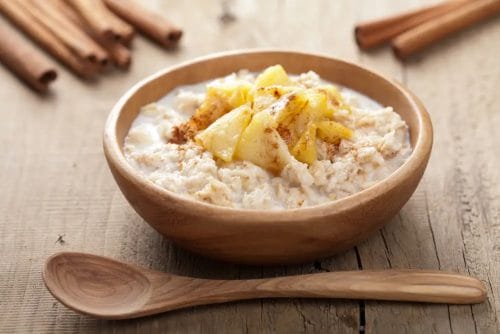
It involves eating only oatmeal throughout the day and eliminating all other foods from the menu. Prepare oatmeal from 8 tablespoons of oatmeal and 2 l of milk with low or zero fat content. Divide it into 6 portions. Eat one portion every 2-3 hours.
The one-day variant of the oatmeal diet is designed to strengthen the body, cleanse the body of toxins, relieve the liver, regenerate organs and tissues, and not to reduce excessive weight.
Admittedly, we may notice a lower body weight after this one day, but it will be a decrease caused by the loss of a large amount of water from the body, and not a reduction in the level of fat tissue. Some people do this diet very often (e.g. every 7 days – for one day a week they eat only oatmeal), but for most people it works better to repeat it once every month or two.
2-Week Oatmeal Diet
In the 2-week oatmeal diet we eat almost exclusively oatmeal on water or skim milk, giving up most of the products that have been part of our daily menu so far. The only thing we can allow ourselves during meals, apart from oatmeal, is a slice of ham or sirloin, a small fat-free yogurt, a vegetable, 1 egg, a fruit, a piece of lean fish, a bowl of cottage cheese, etc.
The daily menu in this variant of the oatmeal diet oscillates around 800-1000 kcal. There is no denying that this diet is very strict, deficient and negatively affects the condition of the body. What’s more, although it allows you to lose a few pounds, very often it also results in a yo-yo effect.
Long-term oatmeal diet
Long-term variation is exactly the variant of oatmeal diet, which we should pay attention to in particular, when we want to lose weight and when we want to improve our health.
It is not a difficult or drastic diet, it contains all the nutrients we need, it does not interfere with the work of the body, as strict diets do. On the contrary, it is pro-healthy, supports the work of organs, improves metabolism and digestion, leads to cleansing the body of toxins, and at the same time stimulates fat reduction.
Being on long-term oatmeal diet, we do not go hungry (we eat a lot of oatmeal, which is very filling!), we also do not have a problem with constant craving for sweets or other favorite snacks (oatmeal stabilizes blood sugar levels, which helps regulate appetite).
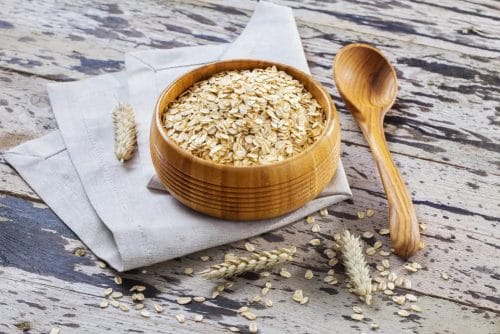
The duration of the long-term oatmeal diet is 4-6 weeks, maximum 8 weeks. The diet is divided into two stages. The first stage is more restrictive but short, lasting only a few days (up to a week). The second stage is less restrictive and lasts a few weeks.
The diet in the first phase should provide us with approximately 1300-1400 kcal. Every day we eat oatmeal with water, skim milk or natural yoghurt (preferably 2-3 times a day).
Apart from this, the menu should include: vegetables, light salads and salads without mayonnaise and oil, fruit and vegetable cocktails, less sweet fruit.
We can also reach for small amounts of lean meat (e.g. chicken or turkey breast fillet, skinless thigh, skinless duck breast, pork tenderloin), lean fish (e.g. cod, hake, pollock, tuna), lean dairy products. We try to include oatmeal in most of our meals.
- 1 breakfast: oatmeal on 0% fat milk
- 2 breakfast: smoothie of tomatoes, peppers and celery with oatmeal
- Dinner: pork tenderloin cooked in vegetables, oatmeal with water
- Tea time: fruit salad (apple, pear, peach, plum)
- Dinner: porridge on water with cottage cheese, diced cucumber and radishes
When the first stage of the diet is over (that is after 5-7 days) we start the second stage, in which we include in our menu more fruit, lean dairy products, lean meat and fish.
We also use other products which are conducive to slim figure, such as: eggs, lean, good quality cold meat, nuts, legumes, seeds. We can also reach for small amounts of brown rice, thick groats, wholemeal pasta and wholemeal bread.
The diet in the second stage should provide us with about 1500 kcal per day. Let’s not forget to reach for oatmeal at least once a day and include oatmeal in the menu as often as possible.
- 1 breakfast: porridge on skim milk with sunflower seeds and raisins
- 2 breakfast: a sandwich of wholemeal bread with lean meat, a glass of smoothie made of mixed fruit and oatmeal
- Lunch: 100 g of wholemeal rice, grilled cod, cooked green beans
- Tea time: Protein omelette with oatmeal
- Dinner: Vegetable leek with oatmeal
Long-term oatmeal diet – products not allowed
Oatmeal diet excludes all products containing large amounts of sugars and fats, as well as unhealthy, highly processed food stuffed with preservatives and other artificial additives.
The list of products not allowed on the oatmeal diet:
- fatty meats,
- fatty meats,
- lard,
- butter,
- mayonnaise, ready-made sauces,
- low-quality meats (e.g. sausages, tinned meat),
- French fries,
- chips, salty sticks,
- sweets,
- sweet cheeses,
- ready-made meals and fast food,
- white bread,
- white pasta,
- potatoes,
- sweet colored drinks,
- sweetened juices and syrups,
- alcohol.
During the oatmeal diet we drink large amounts of water (about 2 l). We can also reach for green tea and unsweetened juices.
If we want to lose weight quickly and efficiently, an excellent supplement to the oatmeal diet will be appropriate dietary supplements. The ideal option here is a slimming coffee drink Cappuccino MCT and vital fibre enriched with additional ingredients with slimming effect Fibre Select.
Both products are excellent at suppressing the appetite, increasing the metabolic rate , stimulating the elimination of toxins and accelerating the reduction of fat tissue. Combined with an oatmeal diet they are sure to bring spectacular results.


